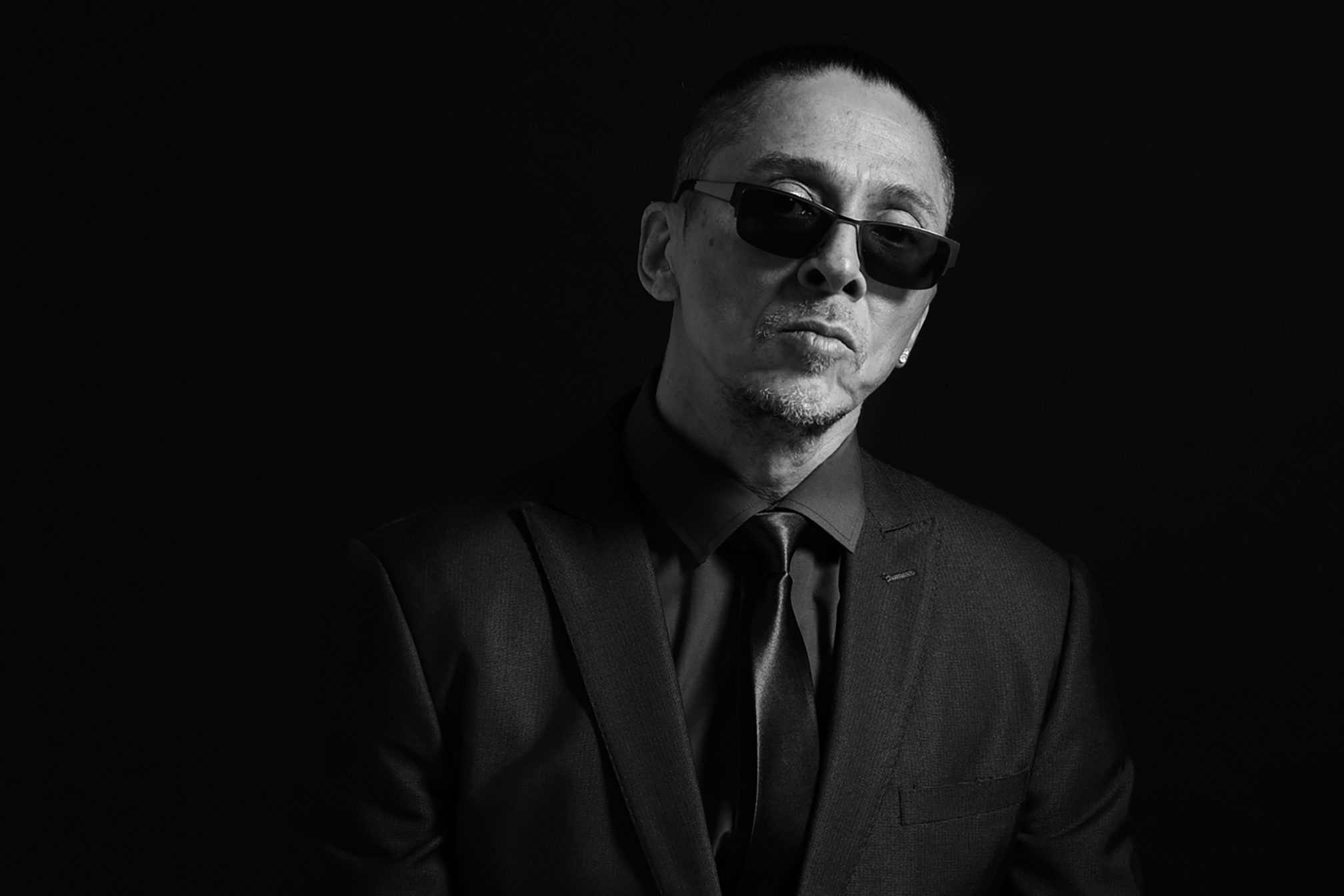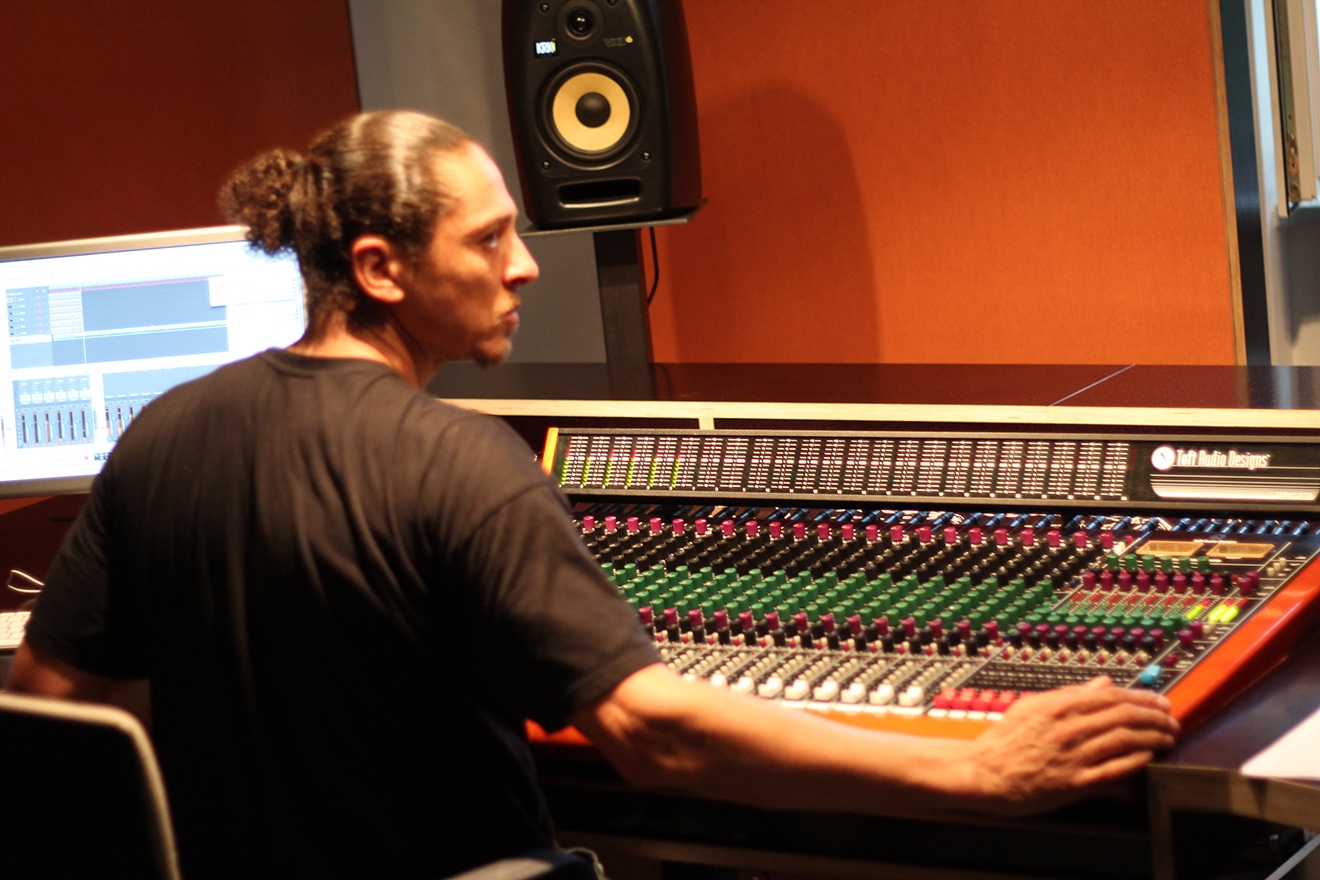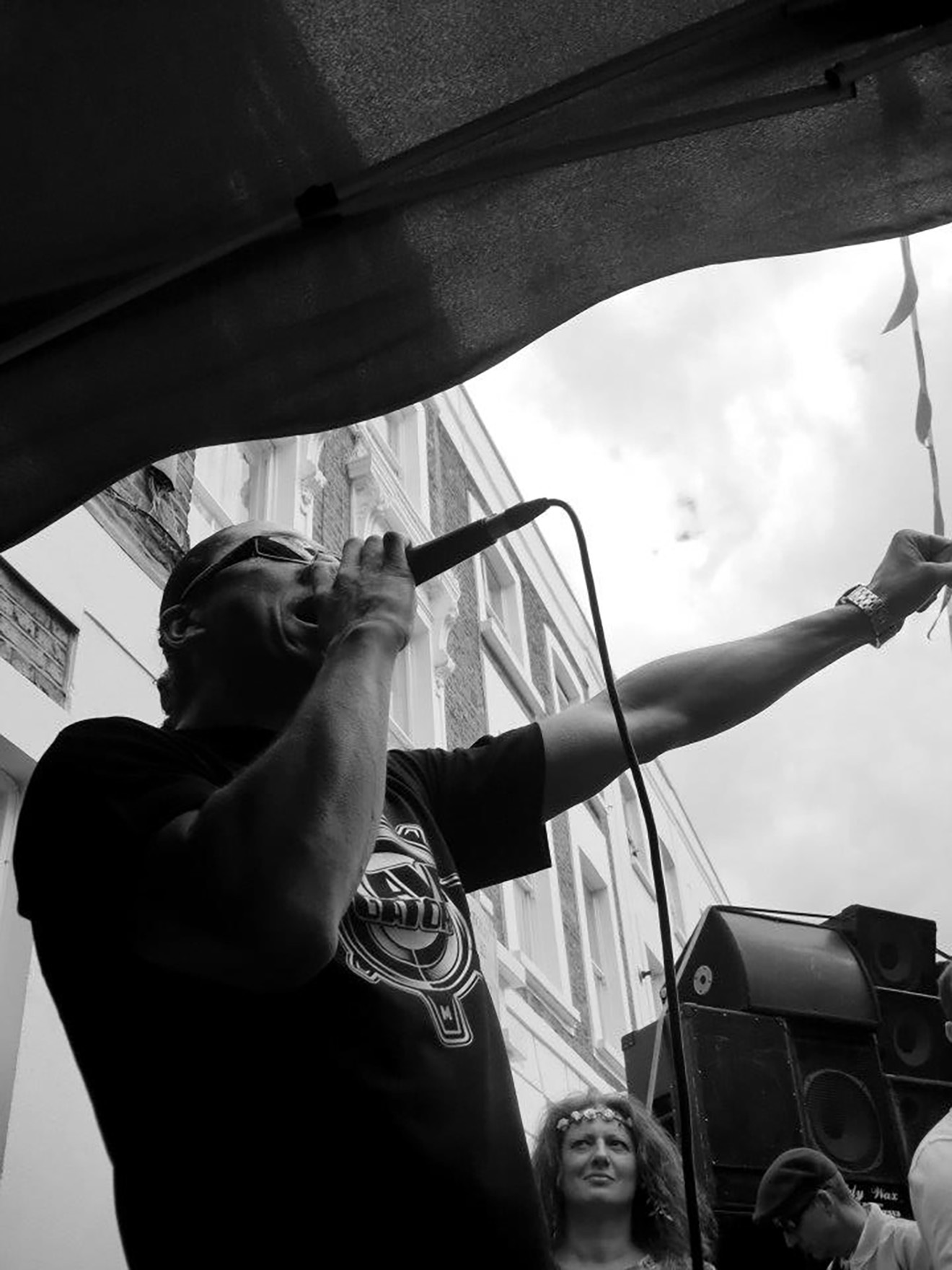 Features
Features
A brief lesson in the origins of jungle from MC Navigator
Semper Azeez-Harris speaks to legendary MC Navigator about jungle and its roots in reggae
It’s not totally clear when ‘jungle’ music started; certainly, those within the inner circle of the genre will have a better idea. For me, however, it started in Ilford East London. 1992 as I ravenously stalked the pivotal Rush FM as jungle walked, slowly trotted, and then galloped into the UK underground musical scene.
Perhaps I should have ‘grown-up’ and decided that heavy basslines, 160 BPM and ragga samples were a ‘fucking headache’. But years later: I am still a lover and still a fan ready to drop my two-step skank at the drop of a “bloodclaart jungle techno” rinse out! So I was positively enthused to interview emcee Navigator, or Navi for short: He is jungle, and indeed drum 'n' bass, royalty.
How can I forget a night-time listening sesh in my room plastered with rave flyers from Jungle Mania, Astoria and more. Hooked onto Kool FM (Saturday), I hear him drop the Troublemaker lyrics.
“At night-time dem screech and bruk inna yu car, rip out stereo den rip out di speaker, weh dem do, carry it inna di bush fi hide it good and proper, then run gone back ah street fi go repeat the whole procedure.”
It was the flow on top of the beat, I was like “yes”. I played my TDK recording of the tape to my boy Jonathan — his response succinct: “That’s fucking serious.”
Read this next: The gentrification of jungle
But while I am buzzing to interview the legend, I also know that I must enter a conversation that could be difficult with Navi. He was a guest on David Rodigan’s BBC Radio 1Xtra show on March 12 this year, when he was asked ‘What’s the difference between jungle and drum 'n' bass’. Now we all know social media can be vicious; it can take you to the highest heights or decimate you as every comment, tweet, Instagram story is unapologetically scrutinized, warped or changed-it’s perfect for Chinese whispers.
For Navi, he began getting the proverbial gunning down for allegedly stating that “jungle music was Black and drum 'n' bass was white.” Comments ranged from disappointment for his so-called ‘racist comments’ to vitriol. Many stating he was suffering from “sour grapes” because he was not in ‘high demand’ and that he was goofing white people.
“I never said jungle music was Black, I just said it was Black-oriented,” he states, clearly irritated. “But people love to hear what they want to hear and make up foolishness,” he adds in his distinctive voice. In fact, talking to Navi, he flits seamlessly from his North-East London roots of Walthamstow and Tottenham to deep roots Jamaican patois without missing a beat. “I am very into my culture. I have always spoken patois as much as I could,” he notes proudly.
Of mixed heritage, Navi is quick to state his own lived experience is not one that errs to bias for Black or white. “My father was part of the Windrush era - I was one of the first wave of mixed-race children from that Windrush era, which as you can imagine was a really difficult time for me. Even now mixed-race people are still frowned upon by Black and white people.”

With his distinctive hairstyle he does not look like a guy approaching 60. He's trim, due to keeping a religious gym routine, good food (“got to look after yourself”), and dressed in contemporary garments. No grandad slippers or Horlicks is to be found in his North-East London home.
“Look, mi been a mic man for 44 years,” he says, elongating the number in his Jamaican patois. “I have seen the music change and charted it. When I did that interview with Rodigan, he said I have a remarkable memory. I remember everything chronologically. Of course, this is from a Navi perspective but truthfully, I remember every single turning point in music since the late '60s. So, when I say what I am saying I can back this up with facts.”
For Navi he was “immersed” in music. “My father’s music was from the '50s and '60s, he would listen to all types of music and artists: Nat King Cole; Brook Benton; Diana Washington, Percy Sledge, Fats Domino. Also, pre-reggae genres, you talking, ska, rocksteady, blue beat. You name it. My dad would play that music in the house.”
Read this next: John Frusciante: “Jungle is my favourite kind of music ever”
It is this immersion in music and his subsequent forays into soundsystem culture that he uses in many ways to substantiate jungle is “Black-oriented”.
“I have been doing soundsystem from 1979, and I joined Unity Sound in 1985 with Demon and Flinty, before they became the Ragga Twins. I have known them over 40 years you know. Flinty was still going to school and Demon Rockers was about 17. Demon was already making waves in Stokey, Tottenham and Hackney.”
He adds: “1988 and '89 I started to see the emergence of this thing called acid house. Like I mostly saw girls out about talking about how good it was and they would be like, 'You should come down'. I was like, 'I ain’t on it, it's ‘devil music’' — because I didn’t really understand the music then. Then Ragga Twins got signed to Shut Up And Dance which was run by Smiley and PJ. Next thing I know I saw them on the Top 40 of Top Of The Pops. Flinty said things are popping off you need to come to these dances!”
Navi sits forward in his chair as if to add weight to his next comment. “Look….Ragga Twins were the first guys I heard on a record that brought the raw reggae/ragga, soundsystem dancehall element on tracks like; 'Spliffhead' [1990], 'Lamborghini' [1991], 'Hooligan 69'' [1991]. At the time there were Black and white people who were making the music. So, it was not a white thing, it wasn’t a Black thing, perhaps I am not even saying it’s a reggae ting, but what I am saying is the way that jungle music buss was oriented from reggae music.”

'Spliffhead' was indeed a seminal and perhaps pivotal track in the genre. Sped-up hip hop beats underpin Ragga Twins with their gravelly, ragga delivery, stating: “Ragga Twins de bout” - jungle emerges. A track guaranteed to lift off any house party or rave.
“No music in the UK has done what jungle did,” states Navi with palpable force. “It united everyone. In the dances I was seeing Black, white, Chinese, Asian, rich, poor, middle class, old, young, age, race, everything - there was no discrimination. What was the main ingredient of the music: it was reggae. Most of the producers were white, but the originators of jungle music were not. You must start talking about Potential Bad Boy, Dizzy, Terry T, Noise Factory, Paul Ibiza, Rebel MC/Congo Natty, Top Buzz & Mad P, Shut Up And Dance and of course, Ragga Twins. They were the forefathers, they were the originators of the music who brought the ragga element to the music and made jungle.”
The aforementioned names were pivotal. Tracks like Rebel MC feat. Frighty & Tenor Fly 'The Wickedest Sound' (1991), Shut Up & Dance's (the duo comprising label founders Smiley and PJ) 'Raving I’m Raving' (1992), D-Force's 'Original Bad Boy' (1993), saw the surge in jungle.
“The pinnacle of jungle was 93/94 when I joined Kool FM,” Navi says. While UK hip hop was doing well, for this writer, jungle as this quintessential UK music was a magical period. Tracks on white labels were coming out 10 to the dozen as jungle had the youth enamoured for the grimy, bubbling vibes.
Rea this next: The 20 best jungle mixes you can listen to online
“There was this ‘DIY’ aspect of jungle,” Navi elaborates when talking about the production of the music. “These were the vinyl days, and these guys were going to pressing plants and pressing a thousand or two thousand copies. Some of these tracks were selling tens of thousand copies. People were making a shit load of money and they did not pay these Jamaican artists they had sampled. The Jamaican artist hear through the grapevine that their vocal has been sampled and then send their bredrins to go and collect for them. So now you have some Jamaican gangster turning up at the pressing plant or distribution plant and saying, ‘Mi hear seh my bredrin’s track sold 40,000 copies weh di money deh?”.
It's an example of that old fashioned condition of too many humans: greed and opportunism. “Ultimately people came in not knowing the business. People knew where the pressing plants were, so they could make a tune on their computer and make some cash. The issue is they were not looking after the artist. People started to say jungle was ‘trouble’,” says Navi.


We go off topic, but it is a central digression on the demise of jungle. I remember jungle becoming this vilified music as stations like Rush FM were raided, police were clamping down on jungle raves of the perceived ‘trouble’ of drugs and criminality. Let’s not forget there were problems that I witnessed at jungle raves no doubt. But for me there was a certain magnification of that trouble. Let’s not forget, whether Black or white, underground music has always been seen as the gateway to unruly youths threatening the stability of society.
“I was riding this wave of jungle music with a few other emcees. It is the first time I am ever seeing decent money. I am thinking I have finally done it. I have made a name for myself, recalls Navi. “However, in 1995 things changed and people stopped playing the ‘ragga shit’. They stopped playing any music with ragga in it or samples. The heyday of jungle was so short-lived.” While jungle was still being made post-'95, I can distinctly remember that this heyday of jungle did slowly disappear.
Read this next: Why dance music culture needs to pay more respect to MCs
I ask why drum 'n' bass has reached and continues to reach the heights it is currently at. “Jungle did not have the commercial success that drum 'n' bass had. It [drum 'n' bass] took things to a whole other level because that is how the majors wanted to put it out there. It was perfect for the majors. There were those who could have taken jungle to another level, but they dropped the ball and decided to go with drum 'n' bass and leave jungle and its association with ragga. Grime music, drill music, jungle music — they all came from an underground place. What blew them up was major record companies with their money putting them through the music/promotional machine.”
As we draw to the end of the interview some 90 minutes later, it still feels like there's plenty to talk about. Of course, what I have written down is but a part of that interview. We discussed the racism he faced in the '70s and '80s UK as a mixed-race person, his soundsystem days, his career blossoming in jungle, and his musical journey. There’s a sense that I have heard just the tip of a very big iceberg called ‘jungle history.’
It was clear from the beginning (for me) that Navi’s statement didn’t come from a racist place the moment he used the word “oriented.” A memory flashes in my mind as my mate Steve (a white guy) was DJing at a thunderous house party, while friends like Okjay (Turkish), Jonathan (Ghanian), Paul (mixed-race) and more got wild on jungle vibes. Jungle originated from a Black music, which is a fact. But what I know and witnessed was that the jungle music scene was all inclusive.
Navigator is releasing a new album later this year
Semper Azeez-Harris is a freelance writer, follow him on Instagram


